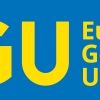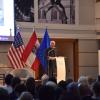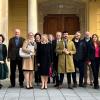
On 25th and 26th of April 2023, IIASA researchers Elena Rovenskaya and Pratik Patil participated as panelists in the EGU conference, which brings together geoscientists from all over the world to discuss latest research on geosciences, climate change, risk and resilience, energy, citizen science, and more. Their contributions were based on their research as part of the Transformations within Reach project at the IIASA
On Wednesday 26th of April, Elena Rovenskaya participated as a panelist in the Union Symposium: Managing compounding impacts from extreme events through societal crises (US1). She presented insights on how science systems can be improved to help societies cope with and prepare for extreme events and societal crises. Her talk was based on the outcomes of the Transformations within Reach-1 initiative, which was first launched in early 2020 as a IIASA-ISC joint initiative. The objective of the Consultative Science Platform: Bouncing Forward Sustainably: Pathways to a post-COVID-19 world was to glean lessons from the COVID-19 crisis and provide recommendations on what should be done to move towards a more sustainable world that would be more prepared for negative shocks.
Rovenskaya stressed the importance of strengthening transdisciplinary research on critical risks, enhancing knowledge diffusion within the science system, increasing the capacity of science to respond rapidly to crises with quality research, improving the quality and efficacy of science-policy interface, enhancing communication of scientific knowledge, public understanding, and trust in science. She also emphasized the importance of multilateralism and establishing a collective security mindset given the global nature of many compounding risks we face.
The day before, on Tuesday 25th of April, her colleague Pratik Patil participated as a panelist in a debate on the topic 'The Science activist: should science get Political? (GDB 3)'. Patil argued that science needs to transcend the status quo and existing social norms to become more value-neutral and less biased. He elaborated how every epistemology (including science) is underpinned by ontology of underlying assumptions, either explicit or implicit, and that we need to make a distinction between value neutrality (e.g. normativity in research design) and empirical objectivity. He also discussed how the scientific enterprise is often co-opted and misused by power structures as a profit machine at the expense of ecosystems and against majority interests. According to him the nature of our most pressing global challenges is demanding a different form of science, and that we have a responsibility to be in alliance with the less privileged and future generations. Full transcript of his remarks is available here.
These remarks and subsequent Q&As were enthusiastically attended by the audience of over 250 researchers as they confront these challenging questions in their day to day research with increasing urgency. Research in the second phase of the Transformation within Reach initiative (TwR-II) aligns with the aim of further elaborating on these questions regarding how science systems can play a more effective role in navigating the Anthropocene.
News

14 June 2024
IIASA Leadership visits Washington DC

23 April 2024
US Permanent Representative to International Organizations in Vienna visits IIASA

07 March 2024

